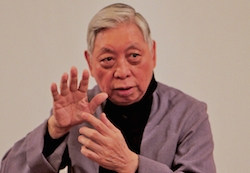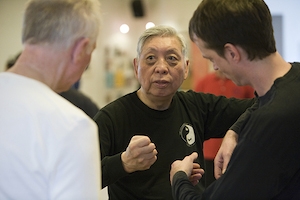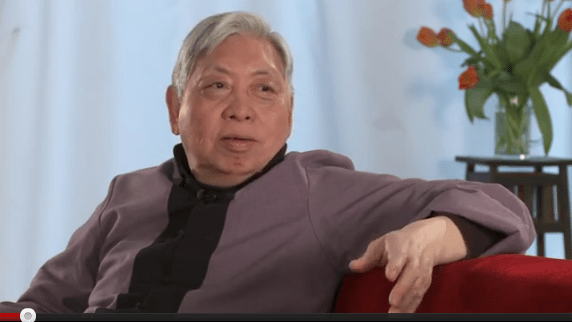
In the year 2000 Tai Chi Grandmaster William C.C. Chen was teaching at Tai Chi Caledonia in Scotland, when event organiser and Editor of Tai Chi Chuan magazine (UK), Ronnie Robinson took the opportunity to conduct this interview.
At that time Grandmaster Chen has studied Tai Chi Chuan for over 50 years, having been a close student of Professor Cheng Man-ching and is world-renowned for his achievements in applying Tai Chi Chuan as an effective martial art.
During his time at Caledonia Grandmaster Chen taught in an open, friendly manner and spent much time informally pushing hands with students of all levels. During our respective busy schedules he was extremely willing to take time out to allow these conversations to take place over lunch at a quiet, country hostelry.
Can you please tell me a little about your introduction to Tai Chi and how you came into contact with Professor Cheng Man-ching?
Professor Chen was a friend of my father, and they were born in the same village, and spoke the same dialect. When he spoke his dialect was very strong and often people, like those he worked with in Taiwan, had difficulty understanding him. Because of his connection with my father I lived and trained in house and also acted as translator.
How did you happen to have a clearer accent?
I was younger and able to adapt. Acting as his translator, and helping to deal with the many questions in a class, meant that a lot of information also came through me.
Why did you go to his class in the first place?
I think that you should look at the book as the story is a little long and I don’t want to get into that.
Can you tell me something about the structure of the classes; what was taught, how often you attended etc.?
When I first started I attended once a week for around one hour. He taught mainly the hand form and talked about the theories and principles of Tai Chi Chuan. After a few months I learned the form and became an assistant, teaching newcomers.
After those first few months of attending his class, some of us started to meet regularly on Sundays at his house. Wang Ying-Nien was one of those who also attended. On those Sundays we worked regularly on push hands with Professor Cheng giving instruction.
So in the regular class, at the early stages, there wasn’t much teaching of push hands?
No. It was mainly the hand form.
How was push hands taught? Did you start off with single hand and progress or what?
No, it was mostly just free pushing. Sometimes it got pretty rough and doors got broken, dishes got broken……
You say that things got rough. Our perception is that push hands should be soft and sensitive, in what way were these sessions rough?
Well things were soft but when you really push you need speed and, in practicing in this way, people were thrown around the room.
We know that in the early stages of learning push hands often students have little awareness of sensitivity, they can be hard and tense with little idea of the concept of ‘softness’, how would you teach them to overcome this? For example, did you start off getting them to feel the lightness and softness or did you work with their hardness and tensions and try to encourage them to gradually take it away?
When you start learning push hands you should begin by being a little soft and then you should keep that softness as much as you can. When people push you just have to neutralise. You had a question regarding sensitivity. To me sensitivity really means reflexes. People often think that the sensitivity can come through learning the form and by continually practicing the form you will become more sensitive. Actually what is happening is that through regular practice of push hands your reflexes increase and you become more relaxed, which in turn leads to increased sensitivity.
It also depends on what you are dealing with when you practice the form. If you are dealing with the idea of the wind blowing through your hands, then what comes through can be different. This morning I woke up at around 5.30 am and was practicing outside in the wind, which I felt blowing through my fingers. However if you are dealing with push hands the feeling of sensitivity is different from this feeling and if you are dealing with fighting the sensitivity is really down to speed and reflexes.
Often people lose this reflex and sensitivity because they are nervous and they tighten up. So how can they overcome this? The Professor always said that when you do push hands, you should invest in loss. I think I am the only that worked in his house, where people pushed over these two years, that never pushed back. One of my classmates said that this was the starting point. During these two years when I was pushing constantly, I was getting pretty good results so it was suggested that we should follow this method. It didn’t really come about because I was smarter than anybody it was probably because, being the youngest, with no social position, I didn’t have to prove anything to anyone. I was happy to be pushed and happy to learn a little about neutralising and ultimately I learned how to survive a vicious push.
What do you feel is the true purpose of working with things like pushing hands, free pushing and applications?
It’s all part of the training. You learn the form, which helps to keep you relaxed and keep you in balance. If someone pushes you, how do you prove the effectiveness of your training in Tai Chi Chuan? When you do it by yourself, and nobody is pushing you, your body can stay soft and relaxed. However when someone pushes you, you want to be able to neutralise. When you neutralise you must also be flexible. The more you push, the more you can train to become relaxed. Once you are relaxed and your body is more flexible, you will have better balance.
Your accomplishments in using Tai Chi Chuan as an effective fighting art have been well documented but how many people do you feel are realistically applying these principles and techniques effectively?
I couldn’t really make any comments. First of all I never really see many people training and, if I do, they often have their own ideas. I always feel that my idea is not perfect and there will always be somebody who has better ideas. I’m continuing to develop my ideas and I’m writing a book about them. The book will not only be interesting for the Tai Chi player but should be of interest to all martial artists. It is an attempt you convey how to use the practical principles of Tai Chi Chuan rather than something about mystical theories. I intend to convince the martial artists of the world that Tai Chi Chuan is one of the best fighting systems for self-defence.
If you make this information available to martial artists, and they believe, from this information that this is possible, how many classes will there actually be, where they are able to get this kind of information?
The ideas are not just ideas for working with in classes; they are actually ideas, which apply to fighting situations.
So they will be able to work from the principles presented in the book and train to apply them effectively?

I’m just a starter. The material presents effective principles of Tai Chi Chuan, which can be worked on.
What I’m thinking of here is of all those martial artists that are working with systems like Karate, Tae Kwon Do and Kick Boxing etc. The ones who look at those slow, slow movements in Tai Chi Chuan and think ‘What?’ That is the book I’m writing. You don’t have to argue with those other martial artists. There are many good, effective systems. It’s just a case of a lack of good information regarding what is being shown through Tai Chi Chuan for self-defence.
One time in Hong Kong I saw a television programme on America Today where they asked some Tai Chi practitioner how Tai Chi could be used for self-defence. He replied that if you have good balance, you’d be able to achieve it. Well that’s not the answer. You have to be much deeper into it. It must be something that’s simple and easy to understand and something that’s practical. That’s the system that I’m writing about.
When I first started learning Tai Chi Chuan, 20 years ago I was told that I was being taught Cheng Man-ching Tai Chi Chuan. Over these years I have seen many others, who say that they too are practicing Cheng Man-ching Tai Chiu Chuan. During the sessions I’m teaching here, using the CMC form as a starting point, I have found three different versions of ‘Lift Hands’ being performed by ten different people who come from three or four different instructors. My questions are: –
a) How important is it to stay true to what CMC had, and is it possible today anyway?
b) How do you feel about the dissipation of the information?
Firstly people starting today are often dropping out from CMC style for one simple reason, he isn’t around anymore and his style can’t be improved upon. There are also many ex-students of CMC who claim to have the real material and they are all contradicting each other. To me it isn’t important whom you learn from, what you’re really getting into, is that Tai Chi Chuan is a really powerful tool. You have to work at it and test the results. The more you practice, the more you work with techniques, the more you will find out, find out if they really are effective.
People say to me that in the old days nobody talked about this system of the Three Nails. I tell them that this is true and that 15 years ago nobody talked about Windows Operating System for computers. That’s not to say that my system is the perfect system, it’s always being improved upon and developed. I may put out the idea of Three Nails 2000 but someone else may develop Three Nails 2002, it doesn’t have to be me, it doesn’t have to be William CC Chen. The information is there and people can take these ideas and work with them improve upon them and develop them.
With respect to forms, there may be a 37, 44 or 108 step form which could be any particular style, the form itself is perhaps not so important as to what you do with it?
Well when we practice forms it’s like every day opening the computer, once we do it there is always some positive outcome but if you don’t do it, it won’t happen. No matter what kind of form you do, if you keep on doing it, then you’ll find out what’s right and what’s wrong. You must also have somebody to play with, to test the practicalities of what you’re doing.
With the many forms around in Tai Chi Chuan, some are aesthetically pleasing, even flamboyant and others are not. Some of the applications or intentions in some forms are obvious while others are perhaps not so obvious, in the standard Cheng Man-ching form it doesn’t always look like too much is happening so how can people get an understanding of what’s in there?
There are a lot of benefits in Tai Chi Chuan for self-defence and also a lot of benefits for health. To me there’s not too much concern in the visual appearance, it’s more the results that are produced from practicing. Which system grows or doesn’t grow depends on the results that are gained from it. The American government are going after Bill Gates because they think he has a monopoly with his system, the truth is that his system gives results and people want it.
I recently received a copy of a book that was Fu Zhongwen’s recording of Yang Cheng Fu’s hand form. In it every posture and transition is detailed in very thorough description. My feelings are that if someone were to pay that much attention to re-creating a form from this information they would be practicing it from the outside in, rather than the inside out and therefore not necessarily practicing Tai Chi Chuan. Some people when practicing may focus on the feeling of the movements while some may sometimes consider the external expression of the art, what do you think people should be thinking about when practicing?
People should just think about the result. If it has a good result keep it, and if it doesn’t, you should change it. You don’t have to be stubborn about it and don’t think too much about the time. Just work at it and look for testing the results. It’s like anything else, like working with a camera. You have to make sure that it works for you. If there is something that makes it easier, makes it simpler then everybody can get benefits.
You have studied Tai Chi Chuan for over 50 years, what has it done for you?
Well it’s helped me make a living. I have to think about the results it has for my students. If they do not get the results they are looking for then they will go away. You have to teach the best you can, particularly if you are doing it for a living, because if your students don’t get results, you won’t keep them, and you won’t be able to make a living. This is also why it is important that you keep learning, doing research and developing with Tai Chi Chuan. This is why when I’m doing workshops where I am teaching I refer to it as ‘we are studying together.’ After the workshops I can sometimes gain more than the students gain.
Many people begin Tai Chi Chuan and they can be looking for many different things, we don’t know what they are looking for and many people stop practicing Tai Chi Chuan. In your schools do you also experience this or do you tend to attract more dedicated students?
My classes are open for everybody. If a student drop-out rate is high you have to think about what you’re doing. The maybe didn’t get the benefits or perhaps your method of teaching has problems then you may have to change things for them, so that they do get the benefits from their training. If they don’t get benefits, they’re not going to keep coming.
But with so many diversities of interest in the various approaches it is not possible to give everybody what they want?
No, but you have to keep open-minded. If somebody is coming for health you must give them the health benefits and if they want to learn self-defence then your give them self-defence.
Although the ideas and principles of Tai Chi Chuan has a long history and the practice of the art in China has gone on for several hundred years, in western terms it is a relatively new phenomena, do you have any feelings about possible differences in the way it is taught practiced in the different cultures?
I don’t really look too closely to the different points of view but to me it’s all the same. Anything that’s good people will accept, if they don’t get benefits they won’t. This applies worldwide. There’s no difference there between Chinese or westerners. Some people are serious, some are not, some people like mystical, some like practical, there are many variants involved but the most important part is that Tai Chi is enjoyable. We want to make it easy, simple and practical to learn and work with, so that people can receive some kind of benefit. That is my objective.

The future depends on what people do with it. I’ve heard people say that they study a Classical, Traditional style of Tai Chi Chuan and I tell them that nobody studies the Classical style of computing anymore, only in museums and archives do they look at the traditional methods. Now the computer has become easier, more compact and more practical and it continues to develop. We should do the same with Tai Chi Chuan. Make it easier to get the benefits. In Professor Cheng’s early book he spoke of simple, easy Tai Chi Chuan and that was his great approach.
In the application of the martial aspects of Tai Chi Chuan we can train the body, constantly practice techniques, increase our levels of fitness, stamina and speed but how effective is it as an art without the use of ‘Internal Energy?’
Internal Energy is there. Whether it is Western Boxing or Karate it is there, but the real difference between the Internal and External is to do with muscles. Generally the application of muscle force is External but with Internal work we don’t concentrate on the muscular force we concentrate on letting the energy flow into the muscles. Like computer we have to use both software and hardware to make them work. It sounds like hard style is different from soft style when actually it is the same. We only possess mind, internal energy flow and muscles and no matter whether you’re in boxing. Karate or Tai Chi, it’s the same thing. Sometimes people only think about the muscles but the energy flow is always there too. You need both internal and external.
Some people say that Tai Chi, without Nei Gong training is not so effective.
I don’t know. It depends on what kind of Nei Gong they are talking about.
So if someone is training in Tai Chi and they don’t have access to Nei Gong training can they still be effective?
Yes, sure. It doesn’t have to be Nei Gong. Nei Gong is only part of the process. Karate and Boxing doesn’t have Nei Gong training but they are there. If there is someone who only trains in Nei Gong without training in fighting then I haven’t met them yet. It’s like if you know all the Tai Chi principles of fighting without actually fighting then it won’t work. If you want to learn how to fight then you have to fight.
My son is fighting in Brazil and people ask me how come I don’t go out to see him fighting. To me it doesn’t matter too much. He’s young, he can afford to lose, maybe the more you lose, the more you gain. The best secret techniques you can learn is in the reality of the tournaments, nobody can hide their secrets there. They will use their best techniques to win and then you can have the opportunity of receiving them. That’s why I encourage people to enter competitions. When my son was seventeen he wanted to fight with a Thai Boxer, I said, “Fine, go and fight under their rules, it’s the only way to learn.”
You’re a man who is still developing his art and you make a point that during your own workshops you are learning too. Do you have any hopes or aspirations regarding your own development?
I gain every day. Different things. That’s why I need time to sort things out and if I’m able to write it down for people to look at and consider and to let them try and experiment with it. That’s the route I’m on. I also tell my son that the fighting that I know isn’t the only way. There are many other ways and he should look at them and experiment with them. There are a lot of people who know a lot of things better than we know. The only way is to continue training and fighting and then you can find out more.
Video “Tai Chi Interview – William CC Chen”
Visit: William CC Chen’s website
Interview with Master William C. C. Chen about Prof. Cheng Man Ching
